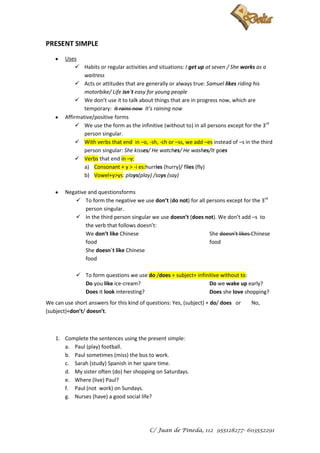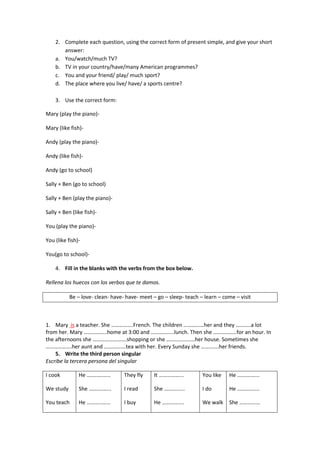Present simple
- 1. PRESENT SIMPLE Uses ïž Habits or regular activities and situations: I get up at seven / She works as a waitress ïž Acts or attitudes that are generally or always true: Samuel likes riding his motorbike/ Life isn`t easy for young people ïž We donât use it to talk about things that are in progress now, which are temporary: It rains now Itâs raining now Affirmative/positive forms ïž We use the form as the infinitive (without to) in all persons except for the 3rd person singular. ïž With verbs that end in âo, -sh, -ch or âss, we add âes instead of âs in the third person singular: She kisses/ He watches/ He washes/It goes ïž Verbs that end in ây: a) Consonant + y > -i es:hurries (hurry)/ flies (fly) b) Vowel+y>ys: plays(play) /says (say) Negative and questionsforms ïž To form the negative we use donât (do not) for all persons except for the 3rd person singular. ïž In the third person singular we use doesnât (does not). We donât add âs to the verb that follows doesnât: We donât like Chinese She doesnât likes Chinese food food She doesnÂīt like Chinese food ïž To form questions we use do /does + subject+ infinitive without to: Do you like ice-cream? Do we wake up early? Does it look interesting? Does she love shopping? We can use short answers for this kind of questions: Yes, (subject) + do/ does or No, (subject)+donât/ doesnât. 1. Complete the sentences using the present simple: a. Paul (play) football. b. Paul sometimes (miss) the bus to work. c. Sarah (study) Spanish in her spare time. d. My sister often (do) her shopping on Saturdays. e. Where (live) Paul? f. Paul (not work) on Sundays. g. Nurses (have) a good social life? C/ Juan de Pineda, 112 955128277- 603552291
- 2. 2. Complete each question, using the correct form of present simple, and give your short answer: a. You/watch/much TV? b. TV in your country/have/many American programmes? c. You and your friend/ play/ much sport? d. The place where you live/ have/ a sports centre? 3. Use the correct form: Mary (play the piano)- Mary (like fish)- Andy (play the piano)- Andy (like fish)- Andy (go to school) Sally + Ben (go to school) Sally + Ben (play the piano)- Sally + Ben (like fish)- You (play the piano)- You (like fish)- You(go to school)- 4. Fill in the blanks with the verbs from the box below. Rellena los huecos con los verbos que te damos. Be â love- clean- have- have- meet â go â sleep- teach â learn â come â visit 1. Mary is a teacher. She âĶâĶâĶâĶâĶ.French. The children âĶâĶâĶâĶâĶher and they âĶâĶâĶ..a lot from her. Mary âĶâĶâĶâĶâĶ..home at 3:00 and âĶâĶâĶâĶâĶ..lunch. Then she âĶâĶâĶâĶâĶ..for an hour. In the afternoons she âĶâĶâĶâĶâĶâĶâĶâĶ.shopping or she âĶâĶâĶâĶâĶâĶâĶher house. Sometimes she âĶâĶâĶâĶâĶâĶ.her aunt and âĶâĶâĶâĶâĶ.tea with her. Every Sunday she âĶâĶâĶâĶ.her friends. 5. Write the third person singular Escribe la tercera persona del singular I cook He âĶâĶ..âĶâĶ... They fly It âĶâĶâĶâĶâĶ... You like He âĶâĶ.âĶâĶ... We study She âĶâĶâĶ.âĶ... I read She âĶâĶâĶâĶ... I do He âĶâĶâĶâĶ.... You teach He âĶâĶâĶ..âĶ... I buy He âĶâĶâĶâĶ.... We walk She âĶâĶâĶâĶ...
- 3. C/ Juan de Pineda, 112 955128277- 603552291



